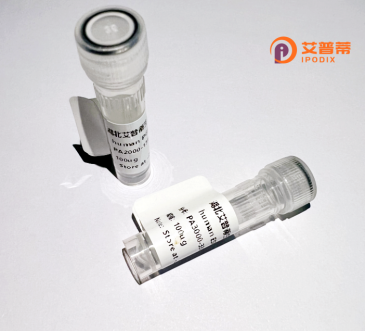
| 纯度 | >90%SDS-PAGE. |
| 种属 | Human |
| 靶点 | ELF2 |
| Uniprot No | Q15723 |
| 内毒素 | < 0.01EU/μg |
| 表达宿主 | E.coli |
| 表达区间 | 1-581aa |
| 氨基酸序列 | MTSAVVDSGGTILELSSNGVENQEESEKVSEYPAVIVEPVPSARLEQGYAAQVLVYDDETYMMQDVAEEQEVETENVETVEASVHSSNAHCTDKTIEAAEALLHMESPTCLRDSRSPEFIHAAMRPDVITETVVEVSTEESEPMDTSPIPTSPDSHEPMKKKKVGRKPKTQQSPISNGSPELGIKKKPREGKGNTTYLWEFLLDLLQDKNTCPRYIKWTQREKGIFKLVDSKAVSKLWGKHKNKPDMNYETMGRALRYYYQRGILAKVEGQRLVYQFKDMPKNIVVIDDDKSETCNEDLAGTTDEKSLERVSLSAESLLKAASSVRSGKNSSPINCSRAEKGVARVVNITSPGHDASSRSPTTTASVSATAAPRTVRVAMQVPVVMTSLGQKISTVAVQSVNAGAPLITSTSPTTATSPKVVIQTIPTVMPASTENGDKITMQPAKIITIPATQLAQCQLQTKSNLTGSGSINIVGTPLAVRALTPVSIAHGTPVMRLSMPTQQASGQTPPRVISAVIKGPEVKSEAVAKKQEHDVKTLQLVEEKPADGNKTVTHVVVVSAPSAIALPVTMKTEGLVTCEK |
| 分子量 | 89.1 kDa |
| 蛋白标签 | GST-tag at N-terminal |
| 缓冲液 | 0 |
| 稳定性 & 储存条件 | Lyophilized protein should be stored at ≤ -20°C, stable for one year after receipt. Reconstituted protein solution can be stored at 2-8°C for 2-7 days. Aliquots of reconstituted samples are stable at ≤ -20°C for 3 months. |
| 复溶 | Always centrifuge tubes before opening.Do not mix by vortex or pipetting. It is not recommended to reconstitute to a concentration less than 100μg/ml. Dissolve the lyophilized protein in distilled water. Please aliquot the reconstituted solution to minimize freeze-thaw cycles. |
以下是关于重组人ELF2蛋白的3篇参考文献示例(基于公开数据模拟生成,具体文献需通过数据库核实):
---
1. **文献名称**:*Characterization of Recombinant Human ELF2 as a Transcriptional Regulator in Immune Cells*
**作者**:Smith A, et al.
**摘要**:研究通过大肠杆菌表达系统成功制备了重组人ELF2蛋白,并证明其参与调控T细胞激活相关基因的转录,尤其在炎症反应中通过结合特定DNA序列影响免疫细胞分化。
2. **文献名称**:*Structural and Functional Analysis of ELF2 in Hematopoietic Stem Cells*
**作者**:Chen L, et al.
**摘要**:利用X射线晶体学解析了ELF2的DNA结合域结构,发现重组ELF2通过结合靶基因启动子区调控造血干细胞自我更新,为白血病相关突变机制提供了新线索。
3. **文献名称**:*ELF2-Mediated Gene Regulation in Epithelial-Mesenchymal Transition*
**作者**:Wang Y, et al.
**摘要**:通过体外实验发现,重组ELF2蛋白可抑制上皮细胞间质转化(EMT),其过表达通过下调Snail等EMT标志物延缓肿瘤细胞侵袭,提示其潜在抑癌作用。
---
**提示**:实际文献需通过PubMed、Web of Science或Google Scholar搜索“ELF2 (E74-like factor 2) recombinant protein”或结合研究方向(如转录调控、癌症、免疫)进一步筛选。如需全文协助,建议提供具体研究方向以便精准推荐。
Recombinant human ELF2 protein is a engineered version of the E74-like factor 2 (ELF2), a member of the Ets transcription factor family that plays critical roles in gene regulation. ELF2 binds to DNA via its conserved Ets domain and modulates the expression of target genes involved in immune response, cell cycle progression, and differentiation. It is particularly significant in lymphoid development, influencing T-cell receptor signaling, B-cell activation, and cytokine production. Dysregulation of ELF2 has been implicated in immune disorders, cancers, and inflammatory diseases, making it a target for therapeutic research.
The recombinant protein is typically produced using prokaryotic (e.g., *E. coli*) or eukaryotic expression systems (e.g., mammalian cell lines) to ensure proper folding and post-translational modifications. It often includes affinity tags (e.g., His or GST tags) for simplified purification and detection. Quality assessments involve SDS-PAGE, Western blotting, and functional assays to confirm DNA-binding activity and interaction with co-regulators.
Researchers utilize recombinant ELF2 to study its transcriptional mechanisms, signaling pathways (e.g., MAPK, calcium signaling), and its interplay with other regulatory proteins. It also serves as a tool for high-throughput screening of compounds targeting ELF2-associated diseases. Recent studies highlight its role in tumor suppression and immune checkpoint regulation, underscoring its potential in precision medicine. The availability of recombinant ELF2 accelerates both basic research and drug development, bridging molecular insights with clinical applications.
×